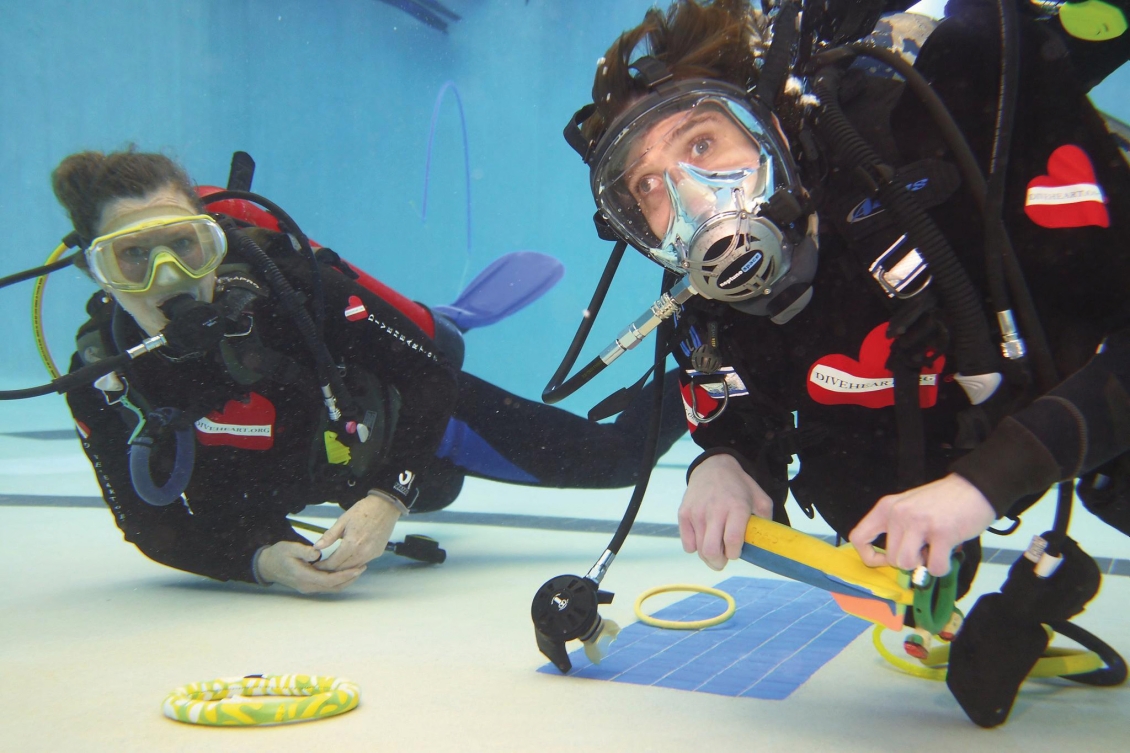
IMMERSION LEARNING: Erin doing underwater activities with Diveheart instructor, Sarah Repka. Erin has a disability from birth, like cerebral palsy. The full face mask is a piece of specialized equipment that allows Erin to experience scuba therapy safely, as she cannot hold a traditional scuba regulator in her mouth.
offer adaptive scuba diving programs. There are also specialized organizations that focus specifically on providing scuba diving experiences for people with disabilities.
Before getting started, do your research. Make sure you consult a physician.
Many programs require a medical form signed by a doctor. It's important to find a program that fits the participant's needs and interests. Some programs may have age or disability restrictions, and others may require certain levels of scuba diving experience or certifications. Additionally, ensure that the program has qualified instructors and follows safety protocols to ensure a safe and enjoyable experience for your loved one.
Once you've found a program that meets your needs, prepare for the experience. This preparation will include what to expect during training and the actual dive, and addressing any concerns or fears your loved one may have. Encourage the participant to embrace this new opportunity, while being supportive and understanding.
During the adaptive scuba diving program, the diver will receive specialized
training and equipment tailored to their needs. This may include trying on adaptive scuba gear, such as: specialized masks, fins, and weight systems, and receiving instruction on using the gear safely and effectively. The training should include basic diving skills: such as buoyancy control, underwater communication, and emergency procedures.
Once your family member has completed the training, they will have the opportunity to participate in a dive. The diving usually takes place in a pool. During the dive, a trained professional will provide assistance and support. These adaptive scuba dive buddies are trained specifically in adaptive scuba diving, as well as knowing about various disabilities, so they can ensure the safety of adaptive divers. The goal of the dive is to give the diver the opportunity to experience the sensation of weightlessness and the feeling of freedom that comes with diving underwater while keeping them safe.
CONCLUSION
Adaptive scuba diving can provide a wide range of therapeutic benefits for children
and adults with disabilities, including improved physical and mental health, increased confidence, and opportunities for social connections and adventure. If you want your family member involved in adaptive scuba diving, do research and find a program that fits the needs and interests. With the right program and support, adaptive scuba diving can be an incredibly rewarding and life-changing experience for your loved one. •
References
Diving Equipment & Marketing Association (DEMA). (2021). 2021 DEMA Market Overview. Retrieved from dema.org/page/market_overview
U.S. Census Bureau. (2019). Annual Estimates of the Resident Population: April 1, 2010 to July 1, 2019. Retrieved from census.gov/newsroom/press-kits/2019/pop-estimates- national-state.htmln
ABOUT THE AUTHOR:
Jim Elliott is the founder and president of the Diveheart Foundation, a non-profit organization dedicated to providing adaptive scuba diving experiences to children, adults, and veterans with disabilities. Jim's passion for scuba diving and helping others led him to create Diveheart in 2001. Since then, the organization has helped thousands of individuals with disabilities experience the freedom and adventure of scuba diving.